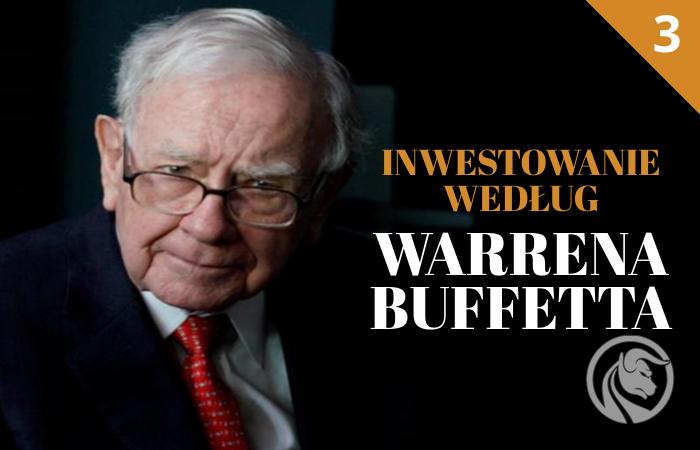Investing in Simple Business Models According to Warren Buffett. Th. III
In the previous parts of the article we wrote, among other things on the analytical way Buffett approaches investments. We also mentioned which ones he is looking for competences in human resources and what advantages does he expect from enterprises. When exploring the secrets of his approach to companies, it is not difficult to notice that he is guided by remarkable rationality, looking for long-term, healthy foundations. In the third part of the article, we will mainly focus on the managerial staff, to which Warren pays extremely high attention. We will discuss aspects answering the questions, e.g. how to recognize honest and competent management? Where to get information about them? What are the integrity signals at the management level of the enterprise? How to recognize accounting manipulations? Is a good manager one who cuts all possible costs? We will try to dispel these doubts in the text below.
Good, which is what?
Finding a manager who loves his job seems like a simple task. Since people choose this profession, they must feel the proverbial mint for it and have such character traits that will help him in this position. However, it is not so banal and obvious. It is difficult to spot those managers who love their work and want to achieve better and better results. A good indicator from which we should start our search is managerial expertise in their field. The Internet offers us a number of social networks, blogs, thematic forums and expert websites that are unique to a specific industry. It is worth looking for whether our "research facility" expresses itself in reputable magazines, gives interviews, broadens its competences or actively participates in industry conferences. This knowledge is quite widely available.
Having no access to a direct meeting with the owner of the enterprise and its managers, it is difficult for us to assess whether the management staff thinks in a manner characteristic of the owner of the company. On the other hand, it is possible to evaluate important business decisions made by senior staff based on, for example, the interests of shareholders (and whether they are taken into account at all). If you want to buy an enterprise, especially taking into account the long-term holding of its securities, you should know the goal (interest) by which you buy its shares. Through such a defined prism, it will be easier to evaluate their actions. Inevitably, having shares of a specific company in the portfolio, we become its co-owner.
Honesty worth all the money
I think that to illustrate this competence I will use the best example, i.e. Berkshire Hathaway. Buffett, as its president, has more than once been famous for his absolute honesty towards his shareholders on the occasion of annual reports. Most often, we can read about them in a letter to shareholders written annually by the oracle. Warren assumes that you (as management) should provide all (not only positive) and reliable information about the company. The owner should know key information such as positive and negative aspects of the business of the company in which he is a shareholder. If we have the impression that the company (when talking to investors) evasively answers our questions or at all, it is worth considering its purchase additionally. It is difficult to assess the value of a company without access to honest and honest information about its core business. Very often, at open meetings, one can notice a certain regularity of the appearance of PR people instead of, for example, general directors or managers. "Agents" do not always speak honestly about the company, and they usually do not have too extensive knowledge that could be presented by management.
We will not write too much about the moral qualities of a good manager. There is a separate article devoted to this, and it is more a psychological issue than purely analytical. However, it is worth quoting as a summary of these considerations Warren Buffett, which he described the decency and courtesy of exemplary management as follows:
“Tabout exactly the guys you would like your own daughter to marry ".
This analogy, of course, applies to men. Nevertheless, it is also aimed at the female part of the management team. Instead, it illustrates the level of trust that Buffett must have in managers.
Watch out for accounting tricks
Financial analysis is the most common method for assessing many aspects related to the valuation and performance of a company. It allows you to assess the level of its debt, liquidity, profitability and activity. So that investors can do this needs objective and precise financial data, which in the course of their preparation, they were not modified or cheated (as in the case of, for example, fixed assets). With no accounting practice (balances, accounting methods, accounts, etc.), it will be hard for us to sense the manipulation of financial statements. There are several solutions to this. Companies that have used such methods and were associated with high-profile scandals on this subject should be avoided. You should also be cautious about auditors who have checked such financial documents. You can also start learning, for example, the basics of accounting, which will not only help you understand the elementary mechanisms that are part of reporting, but will also facilitate the future analysis of the company.
It is an interesting procedure in terms of accounting cost manipulation restructuring. What embezzlement can be committed in them? Without extensive and intricate accounting translations, it is primarily about mis-accounting of restructuring costs. If the manager expects with high probability that the company will show costs higher than average in the coming years, he may show the whole restructuring in the current quarter and, prover, suffer a large drop in profits only there. Another very interesting case that Warren Buffett noticed is showing the above costs in the company's books, fresh from replacing the old director with a new one. This is usually related to the indication of good results over time (high costs at the start) and the reduction of costs that can be attributed to the new management and making the right decision by, for example, the management board, to change the person in this position.
How to protect yourself against manipulation? Of course, getting to know elementary accounting issues should not be a problem for anyone. The second, more important aspect is the ease with which we can understand the presented financial data. If it is difficult to understand their record and essence, we should take it as the first warning signal.
Control, control, control ...
Meticulous cost control is certainly a skill that many companies need. We, on the other hand, when choosing a company for our portfolio, should look for a management team that does not spend the money of the owners of the company (that is also ours). What limitations should we look for? Two positions can be shown in the cost analysis. On the one hand, managers who make them grow tend to have a lot of ideas that they test. Therefore, the most desirable situation would be to reduce costs where they are actually strongly overstated by using, for example, outdated production methods, and allowing them to be used in places that may build our competitive advantage on the market.
You should be very cautious about any high-profile cost-cutting announcements. When looking at most of these declarations, they are intended to attract attention rather than actual changes. A good manager keeps an eye on the analysis of the company and its functioning in individual departments, wishing to improve processes and minimize costs where it is possible and will not affect efficiency. It is an ongoing process. Nobody gets out of bed and over their morning coffee does not say that today is a fantastic day to look at the company from this angle.
Summation
The above text was mainly intended to show you the aspects that are worth paying attention to when choosing a company. When choosing our first enterprise, most of us probably did not pay the slightest attention to the staff or did not deliberate too much on financial data (in terms of their incorrect valuation). We focused on analyzing the statements or the cash flow statement. Warren Buffett is known not only for his instinct to buy a business, but also for his detail. He greatly appreciates honesty and morality in people at higher levels. Since the richest investor in the world pays attention to the human element in the form of human resources in the entire decision-making process related to the purchase of a company, it is worth reading the suggestions described above to know what to pay attention to.






















![Forex Club – Tax 9 – Settle tax on a foreign broker [Download the Application] Forex Club - Tax 9](https://forexclub.pl/wp-content/uploads/2024/02/Forex-Club-Podatek-9-184x120.jpg?v=1709046278)
![Trading View platform – solutions tailored to the needs of traders [Review] trading view review](https://forexclub.pl/wp-content/uploads/2024/03/trading-view-recenzja-184x120.jpg?v=1709558918)
![How to connect your FP Markets account to the Trading View platform [Guide] fp markets trading view](https://forexclub.pl/wp-content/uploads/2024/02/fp-markets-trading-view-184x120.jpg?v=1708677291)
![How to invest in ChatGPT and AI? Stocks and ETFs [Guide] how to invest in chatgpt and artificial intelligence](https://forexclub.pl/wp-content/uploads/2023/02/jak-inwestowac-w-chatgpt-i-sztuczna-inteligencje-184x120.jpg?v=1676364263)


![WeWork – the anatomy of the collapse of a company valued at $47 billion [WeWork, part II] wework bankruptcy story](https://forexclub.pl/wp-content/uploads/2024/04/wework-bankructwo-historia-184x120.jpg?v=1711729561)
![Adam Neumann – the man who screwed up Softbank [WeWork, part AND] adam neumann wework](https://forexclub.pl/wp-content/uploads/2024/04/adam-neumann-wework-184x120.jpg?v=1711728724)





![How to transfer shares to another brokerage office [Procedure description] how to transfer shares to another brokerage house](https://forexclub.pl/wp-content/uploads/2024/03/jak-przeniesc-akcje-do-innego-biura-maklerskiego-184x120.jpg?v=1709556924)

![The most common mistakes of a beginner trader - Mr Yogi [VIDEO] Scalping - The most common mistakes of a beginner trader - VIDEO](https://forexclub.pl/wp-content/uploads/2024/03/Scalping-Najczestsze-bledy-poczatkujacego-tradera-VIDEO-184x120.jpg?v=1711601376)
![Learning patience: No position is also a position - Mr Yogi [VIDEO] Scalping - Learning patience - No position is also a position - VIDEO](https://forexclub.pl/wp-content/uploads/2024/03/Scalping-Nauka-cierpliwosci-Brak-pozycji-to-tez-pozycja-VIDEO-184x120.jpg?v=1710999249)
![When to exit a position and how to minimize losses - Mr Yogi [VIDEO] Scalping - When to exit a position and how to minimize losses - VIDEO](https://forexclub.pl/wp-content/uploads/2024/03/Scalping-Kiedy-wyjsc-z-pozycji-i-jak-minimalizowac-straty-VIDEO-184x120.jpg?v=1710336731)



![How to invest in ChatGPT and AI? Stocks and ETFs [Guide] how to invest in chatgpt and artificial intelligence](https://forexclub.pl/wp-content/uploads/2023/02/jak-inwestowac-w-chatgpt-i-sztuczna-inteligencje-300x200.jpg?v=1676364263)












